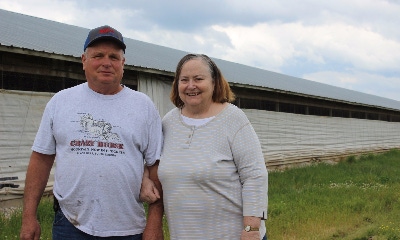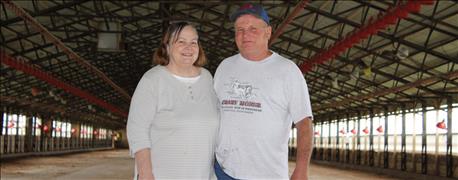
They were high school sweethearts. Their lifelong dedication to family and farming kept the couple tethered to their roots in Moniteau County. As a couple, they were comfortable raising crops and cattle. That all changed in 1994 when Paul and Sue Allee added turkeys to the family farming operation.
At that time, Paul's brother-in-law, Rodney Fulks, wanted to return to the family farming operation. However, there just wasn't enough income with the cattle and crops to support another family on the farm, so they decided to add turkey barns to the production mix.
The operation
The family became contract growers for Cargill Turkey Production and set out to build a turkey business.

HIGH MARKS: USPOULTRY recognized Paul and Sue Allee as a Family Farm Environmental Excellence Award winner during International Poultry Expo, part of the 2016 International Production
Today, There are two types of barns at the farm--a brooder house and grow out barns.
The brooder house is where day old poults arrive at the farm's growing facility just west of California, Mo. The birds originate from Ohio and Minnesota. This barn is vital to getting the young poults off to a healthy start, so the family ensures that there is proper heat, ventilation, food and water.
At about 5 weeks the turkeys move to the grow out barns. They remain there for roughly 11 weeks, according to Paul. "We feed them to 22 to 24 pounds before they are shipped," he adds.
The farm is home to 16,000 big hens at a time and they have four flocks per year. Since the turkey operation started in 1994, the family has cared for roughly 1.32 million turkeys.
While the turkeys are a valuable asset to the farm, it is what comes out of the turkeys that generates even more income for the family and causes the farm to focus on litter management.
~~~PAGE_BREAK_HERE~~~
The litter
At Wildcat Hill Turkey Farm, they work to minimize the amount of litter actually being taken from the barns.
The family uses a litter machine to recycle the litter within the barns without removing more litter than necessary. Litter from the brooder house is moved to grow out barns to maintain health.
Still the Allees remove up to 900 tons of litter per year from their barn.
In the past, the family spread the litter on its crop and pasture ground. "Now we deliver it to the co-op," Paul notes. It is not a far drive, since the Central Missouri Poultry Producers compost building is located on 10 acres that Paul sold to the cooperative.
However, he is a big believer in the nutrient value of turkey litter for growing crops and grass. So much, that while all of his turkey litter goes to the co-op, he buys litter from neighboring turkey growers to put on his own land. "It sounds crazy," he says, "but it works. I love the results I get from using litter on my land."
The next generation
Ensuring proper management of manure is important to the environment. The Allees took that step in becoming part of a cooperative that composts and sells the turkey litter.
The Allees deliver litter to the co-op. The enclosed facility allows litter to be storied inside, reducing the possibility of runoff. When using poultry litter on the family farm fields, the Allees comply with the farm's overall Nutrient Management Plant. They take soil and litter samples yearly and make sure it is on file with the Moniteau County Natural Resource Conservation Service office.
But for the Allees it is more than just numbers. They want the dream of two high school sweethearts to live on.
"We now have our grandson as an employee of the turkey barns," Sue says. Adam Allee, the fourth generation, helps run the operation. "It was our goal to keep the farm in the family," she adds. "Our family farm has been around more than a century--since 1898. We want it to remain for more years to come. Protecting our environment is one way to make sure that happens."
About the Author(s)
You May Also Like






